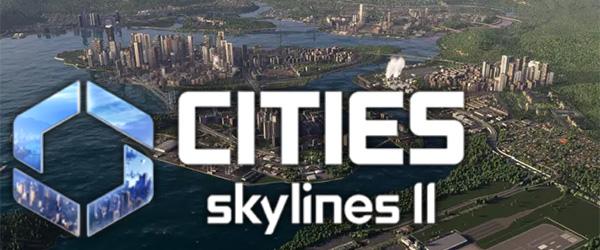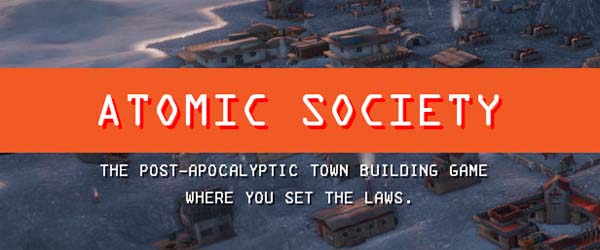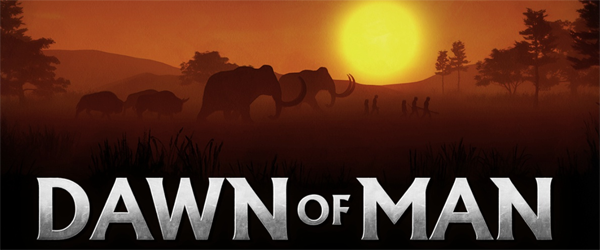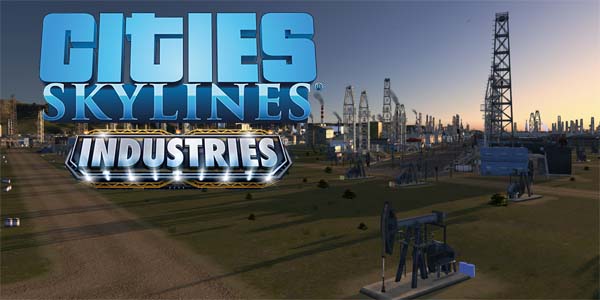
I've been playing Cities: Skylines for almost 10 years. As soon as I started playing it, I recognized it as the definitive city-building game. It blew its contemporaries, such as SimCity (2013) and Cities XL out of the water. It was a smash success that developed a massive following and spawned 11 full expansions, 4 mini-expansions, 21 asset packs, numerous music packs, and thousands of player-created mods and custom assets.
Creating a sequel to a game that is so beloved and content-rich can be challenging or daunting. Sequels to extensively-expanded games, such as any given entry of The Sims, Civilization, Crusader Kings, World of Warcraft, Rock Band, and so forth, run the extreme risk of feeling bland, empty, and incomplete compared to their content-rich and/or mechanically-complex predecessors. This can leave the sequel feeling underwhelming to long-time audiences, who might return to the older game because they crave the extensive, familiar content. The Sims in particular is infamous for stripping out popular expansion content, and then selling that content back to consumers again (and again) as an expansion pack for the sequel. The most notable example is probably that every Sims game has a "Pets" expansion, because EA could never bite the bullet and just put dogs and cats in the vanilla launch of a sequel.
Sequels to expanded games often strip out popular content to re-sell as expansions.
The sequel to Cities: Skylines is a bit of a mixed bag in this regard. On the one hand, yeah, a lot of content from the original game is absent from the sequel, and the options for what players can build can feel a bit sparse. On the other hand, the vanilla release of Cities: Skylines II retains something from almost every one of the original game's expansions. It even includes content and mechanics that were part of some of the smaller content packs and from popular mods.
The vanilla game includes a day/night cycle that was introduced in the original's After Dark expansion. Some of the economic models of the After Dark and Industries expansions have been expanded in scope to apply to the entire game, thus alleviating some of the need for explicit tourism, leisure, or specialized industry districts. It took the winter themes of Snowfall and fleshed it out into a full seasonal cycle. It includes some of the weather and disaster events from Natural Disasters, as well as some of the early-warning and shelter infrastructure. It includes modular upgrades and customizations to certain buildings and infrastructure, as well as large industrial areas, that fills a similar role as the modular areas of Parklife, Industries, Campus, and Airports (though I'll talk more about this mechanic later in the review). It includes pedestrian roads from Plazas & Promenades. It includes eco-friendly variations of utilities that were part of the Green Cities expansion. And of course, it has road-building and transit-planning tools that largely leave Mass Transit in the dust.
It even includes sports parks and parking lots, which were late DLC content released for the original game in the last couple years. And the road-building and traffic-management tools have much of the functionality from the popular "Road Anarcy" and "Network Extension" mods. And that's to say nothing of all the brand new content, mechanics, and more complicated simulation! So even though it is not as full or content-rich as its predecessor with its double-digit expansions (how could it be?!), Cities: Skylines II is still a fully-featured and content-rich city-builder that can be played for many hours before going stale.
Some content and mechanics from almost every CS1 expansion are included in CS2's launch.
But as I said, there is quite a lot of content from the original game that did not make the cut, and which is sorely missed. For one thing, bicycles and bike lanes aren't in the game at launch, which is a kind of baffling decision (considering this game is developed in Scandinavia, where bicycling is huge). There also aren't any walls or fences or quays, and the tool for disabling zoning on either side of a road is strangely absent. So it's back to using pedestrian paths to remove zoning from arterial roads. Zoning is actually quite a bit of a pain in the ass in the sequel, and I am frequently fighting with the road layout, zoning squares, and pedestrian paths to try to get my city to look the way I want.
If you were particularly fond of leveling up and expanding things like industrial parks, nature preserves, amusement parks, universities, and so forth, then you might be disappointed by their absence. In fact, recreation, leisure, and tourism options are very spares in the sequel, as it lacks the tourism and leisure districts of the After Dark expansion. You also won't be building any small fishing villages, since Sunset Harbor is the one expansion that doesn't have anything being carried over into the sequel.
To its credit, the vanilla release of Cities: Skylines II feels more content rich and mechanically-compelling compared to the vanilla release of the original Cities: Skylines. But there's so much absent from the original game, that I un-install the original from my PC with a degree of trepidation.
There is some content from CS1 that is conspicuously absent. [More]
a2c0f15c-0983-4034-a8e5-7561b2c76190|0|.0
Tags:Cities: Skylines, Cities: Skylines 2, Colossal Order, Paradox Interactive, city, city management, city simulation, seasons, industry, parking, tourism, poverty, homelessness, welfare, subsidies, ray-tracing, volumetric lighting, Sedona, Barstow

After going back and revisiting Cities Skylines for its Airports expansion and being thoroughly underwhelmed, I decided to did into my Steam backlog for some other lightweight city-builders. Far Road Games' Atomic Society had just left early access in August of 2021, so I went ahead and downloaded it to give it a try. And I was underwhelmed again.
Atomic Society just doesn't have enough content to keep me playing for very long, and the content that it does have is not nearly as engaging as I would like for it to be. It is a town-builder with a post-apocalyptic theme that seems to be heavily inspired by Fallout (possibly by Fallout 4's settlement customization mechanics). In fact, despite being a town-builder, Atomic Society requires the player to create an avatar character whose backstory is that they had emerged from a fallout shelter and is attempting to lead a band of wasteland survivors to a new home. So yeah, it's basically what you get if you imagined Fallout 4's settlement management in the form of a top-down city-builder instead of a first-person shooter. Sounds good on paper, but Atomic Society is far from the best possible take on the subject matter.
Imagine the settlement-building of Fallout 4 ... but without any of the personality.
Wandering alone
New buildings are few and far between. Because this is a post-apocalyptic game with very scarce resources and population, the total number of structures that need to be built is relatively small (though multiple copies of many basic buildings are required, and I'll be talking about that soon). As such, most of the actual game consists of micro-managing the Town Leader. This Town Leader is usually the one who has to build new structures by hand, and who has to go in and salvage materials from ruined structures and vehicles.
In fact, micro-managing this one character is so critical to keeping your town running, that the SPACEBAR (of all buttons!) is assigned the sole function of automatically selecting and centering the camera on the Town Leader. Usually, I would expect the spacebar in a town-building game to do things like pause or unpause the simulation, or to bring up the build menu or some other important management menu. Nope. In Atomic Society, the most important button on the keyboard is for selecting the Town Leader.
The Town Leader will be doing most of the scavenging, building, and repairing.
Micro-managing the Leader wouldn't be so annoying and tedious if the U.X. for managing him were a bit better. For instance, it would be nice to have a widget in the corner of the screen somewhere that shows what the Town Leader is doing at all times, and a small overview of his current inventory. There's not even a mini-map or hotkeys to quickly navigate to important locations on the map. It would also be really nice if the player could queue up actions for the Leader. Without being able to put multiple actions in a queue, I am stuck having to pause the game every few minutes to check on what he is doing and manually assign him to his next task. I'm constantly stopping the game to tell him to run to a salvage site, then back to a stockpile to drop off the materials, then out to build some building, then somewhere else to repair some building before it collapses, then back out to another salvage site.
All this babysitting gets very tedious, very quickly. Worse yet, when it does come time to actually build things, the need to manage the Town Leader can often get in the way and disrupt the flow of settlement-planning.
It doesn't help that path-finding is completely broken. I'll tell him to go to a ruin site or to deposit his inventory in the nearest storehouse, and he'll circumnavigate the entire map to get there instead of taking a direct route. Or he'll pass by right by a storehouse to get to a different one further away. And if I want him to go to a specific nearby storehouse that he refuses to path to on his own, the only alternative for me is to take manual control and walk him across the map myself using the W,A,S,D keys. It's just miserable. [More]

From what I've read, Madruga's indie management sim Dawn of Man has proven to be far more successful than the developers had ever imagined. The game made it onto Steam's top-sellers list the month that it released and was a surprise hit. I've actually had the game on my radar for quite some time. I saw a preview for it back in mid 2018 in a YouTube video about "upcoming strategy games for 2019". I watch those from time to time to see if any new games are coming out in the niche genres that I enjoy -- like city-builders, strategy games, and horror games.
My two favorite PC games are the Civilization games and city-builders like Cities: Skylines, so a management sim / city-builder set during the stone, bronze, and iron ages seemed right up my alley.
A prehistoric city-builder is an idea that is right up my alley!
Like any good management sim or city-builder, Dawn of Man has a "one-more-season" addictiveness that kept me playing into the wee hours of the morning trying to balance my food stockpiles and finish that next set of construction projects before saving and quitting. I'd tell myself that I'd play it for an hour or two, then switch to Sekiro, or work on a Civilization strategy guide, but five hours later, I'd be building palisades and watchtowers to protect my little neolithic farming village from plundering raiders, or sending an expedition halfway across the map to hunt one of the last few remaining wholly mammoths.
Learning by doing
You start the game as a small group of 7 paleolithic humans (half of which are children) living in a handful of animal skin tents. You hunt animals, gather sticks and stones, pick berries and nuts, craft simple tools, and eventually expand your handful of tents into a bronze or iron age city -- complete with walls and an army.
Your progress through the eras is governed by the accumulation of knowledge points. These knowledge points are gained by completing certain tasks or milestones within the game. Your people effectively learn by doing, and through repetition. Each "first" within the game will earn a knowledge point. Build your first hut: gain a knowledge point. Hunt your first deer: gain a knowledge point. Craft your first composite spear: gain a knowledge point. Plant your first crops: gain a knowledge point. And so on.
You accumulate knowledge points by
completing in-game tasks or milestones.
After that, you gain further knowledge points by repeating certain tasks or stockpiling certain resources. Crafting 10 bows will be another knowledge point. Drying and curing 100 units of meat would be another knowledge point. And so on.
You're constantly and gradually earning new knowledge. You can turn in lump sums of these knowledge points for new technologies in a technology tree.
I like this mechanism of "learning by doing". There is no place-it-and-forget-it "research" building or school that passively accumulates knowledge points like what you might see in other strategy games like Civilization. Learning is an active process for your little simulated people, even though most of your knowledge points will come from activities that are automated anyway.
... [More]
8bb5fcaa-40f9-429e-bb8c-c0e44b7d6529|2|5.0
Tags:Dawn of Man, Madruga Games, village, city, strategy, city simulation, city planner, prehistory, paleolithic, mesolithic, neolithic, copper age, bronze age, iron age, mammoth, hunting, gathering, indie gaming
Last week, just in time for the announcement (and release) of a new expansion for Cities: Skylines, I posted a video analysis on YouTube discussing what I perceive as weaknesses in the modular design philosophy behind Skylines' myriad expansion packs. The full video is available on YouTube (and embedded below), but I've also transcribed the text in blog form for those who may prefer reading over watching/listening.
The video is up on YouTube.
I want to start out by saying that I love Cities: Skylines. Skylines is -- without a doubt in my mind -- the single best city-builder since SimCity 4, which released in 2003 (over 15 years ago, as of the time of this recording). When I watched the first trailer for the game, in which the player apparently custom-builds freeway ramps and interchanges from scratch (at about 40 seconds into the trailer), I was sold on this game! After years of having to use boring, pre-fabricated stock on-ramps and interchanges, the little civil engineer withing me practically jizzed in his pants at the idea of being able to build my own highway ramps and interchanges! And there was no looking back.
Cities: Skylines gloriously succeeds where games like SimCity (2013) and Cities XL miserably failed. It picks up the mantle of the great SimCity games of yester-decade, and brings it into the 21st century with deep simulation based on agents, a sleek and modern UI, extensive customizability and moddability, and an attractive 3-D graphics engine. It's made all the more impressive by the fact that the game's developer, Colossal Order, is a small, independent studio that had something like nine people working for it when the game initially launched. And a company with all the manpower and resources of Electronic Arts only managed to produce a flop like SimCity 2013.
... [More]
cdac9d28-8482-4449-a673-ff10d4b7cc87|0|.0
Tags:Cities: Skylines, Cities: Skylines: After Dark, Cities: Skylines: Snowfall, Cities: Skylines: Natural Disasters, Cities: Skylines: Mass Transit, Cities: Skylines: Green Cities, Cities: Skylines: Parklife, Cities: Skylines: Industries, Cities: Skylines: Campus, Colossal Order, city planner, city simulation, strategy, Steam, Paradox Interactive, expansion, YouTube, Sid Meier's Civilization, Civilization V, Civilization V: Brave New World, Civilization VI, Civilization VI: Rise and Fall, Civilization VI: Gathering Storm

Wow, Colossal Order is really popping out these Cities: Skylines expansions in rapid succession! I feel like this is the third or fourth expansion in the last year alone! ... Hold on, let me check ...
| Expansion title | Original release |
 | After Dark | 24 September 2015 |
 | Snowfall | 18 February 2016 |
 | Match Day* | 9 June 2016 |
 | Natural Disasters | 29 November 2016 |
 | Mass Transit | 18 May 2017 |
 | Concerts* | 17 August 2017 |
 | Green Cities | 19 October 2017 |
 | Parklife | 24 May 2018 |
 | Industries | 23 October 2018 |
| * denotes a mini content pack, rather than full expansion. |
... So, yeah; third full expansion in the last 12 months (give or take a few days). Fourth expansion in the last 14 months if you want to count the Concerts content pack. Colossal Order seems to have been following a pattern of two full expansions and a mini content pack each year since the game released. I guess that's one way to keep your game relevant. It has certainly kept me coming back every few months.
Never as robust as I would like
The problem is that the limited development time means that the content that is provided in these expansions rarely ever feels as robust or comprehensive as it should -- at least, not to me. As such, I feel like I'm getting diminishing returns from each new expansion. The amount of content that is already in the game means that each new expansion feels like relatively smaller drop of content into an already-large bucket. Each expansion feels like it gives us less to do, and has that much of a smaller impact on the overall gameplay experience.
Adding to the problem of diminishing returns: every single expansion has had some glaring omission or weakness that bothered me, and none of the later expansions have bothered to go back in and address the weaknesses and limitations of the previous expansion(s). After Dark failed to include zoneable public beaches and didn't really make the day/night cycle feel as meaningful as it should. Snowfall failed to include season cycles to go along with After Dark's day/night cycle, and completely dropped the ball with regard to mechanics like ski resorts. Natural Disasters probably felt like the most "complete" and well-rounded expansion (not to mention the most novel one), but still suffers from its content being random, and it neglected to introduce any winter-specific disasters to go along with Snowfall.
Industries follows a long-standing trend with Skylines expansions neglecting seemingly-obvious features.
Mass Transit brought the long-overdue ferry transit option, but neglected to revise cargo harbors to make cargo ship routes more practical, and didn't have any water-based city services (like a coast guard, for example) that would allow a true island economy to function without a network of bridges for freight and emergency services. Green Cities was maybe the laziest expansion, and it focused on pollution-management, but didn't bother to actually make pollution any more relevant or challenging to begin with. Lastly, Parklife granted a lot of player expression, but failed to incorporate the legacy parks into the new modular park feature and doesn't allow the camera to zoom in close enough to get a good look at your pretty decorations.
This isn't to say that all these expansions are "bad". I've liked them all (except maybe for Snowfall and Green Cities), but none of them have really wow-ed me with their content (except maybe for Natural Disasters). And the modular nature of each expansion means that it has limited-to-no impact on the core game systems, and limited-to-no interaction with the previous expansions.
The latest expansion, Industries follows suit. It promises to re-invent the way that your cities' industry functions, but kind of does it in an almost half-assed way. Much like the expansion before it, Parklife, Industries doesn't really incorporate the old legacy industry zones into the new industry mechanics. The new "Industry Area" paintbrush is virtually the same mechanic as the Park Area paintbrush from the last expansion. It isn't a replacement for the original industrial district specialization, so if feels like it's pretty much duplicating that content rather than re-inventing it.
You paint an area as an "Industrial Park", just like the parks in Parklife.
... [More]
e7bfb680-e9c4-4e53-a202-52f87d32d445|3|3.7
Tags:Cities: Skylines, Cities: Skylines: Industries, Colossal Order, Paradox Interactive, city, city planner, city simulation, Cities: Skylines: Parklife, Cities: Skylines: After Dark, industry, pollution, natural resources, resources, production chain, district, farm, timber, lumber, ore, mining, oil, drilling, leisure, commerce
|

| 12 | | | | | | | 60 | | 11 | | | | | | | 55 | | 10 | | | | | | | 50 | | 09 | | | | | | | 45 | | 08 | | | | | | | 40 | | 07 | | | | | | | 35 | | 06 | | | | | | | 30 | | 05 | | | | | | | 25 | | 04 | | | | | | | 20 | | 03 | | | | | | | 15 | | 02 | | | | | | | 10 | | 01 | | | | | | | 05 |
|